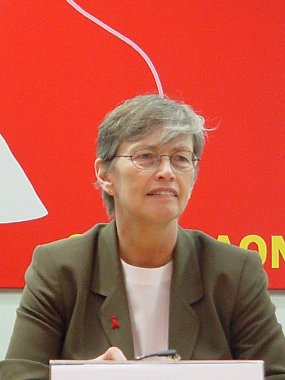
"The orphan crisis is arguably the cruelest legacy of the AIDS pandemic," says Carol Bellamy
18 Million AIDS Orphans Expected by 2010
Numbers Skyrocket in Africa, Asia -- Fall in Other Parts of the World
By Charlene Laino
WebMD Medical News Reviewed By Michael Smith, MD
on Tuesday, July 13, 2004
More From WebMD
Like This Article? Send It to a Friend
July 13, 2004 (Bangkok, Thailand) -- Fifteen million children have lost one or both of their parents to AIDS, according to a United Nations report released Tuesday.
And there's no end in sight: By 2010, 18.4 million children -- more than one in three orphans -- will have lost parents to AIDS, the reports states.
The distressing figures come at a time when scientists had expected a significant drop in the number of orphaned children worldwide, due to better health and nutrition, doctors tell WebMD.
"The orphan crisis is arguably the cruelest legacy of the AIDS pandemic," Carol Bellamy, executive director of UNICEF, told a press briefing at the XV International AIDS Conference. "This is a tidal wave."
American actor Richard Gere tells WebMD that like so many aspects of the HIV pandemic, the AIDS orphan crisis is spiraling out of control.
According to the new report, children in sub-Saharan Africa have been hardest hit; by 2010, there could be as many as 17 million youngsters under age 18 who have lost at least one parent to AIDS. The proportion of youngsters who have lost parents to AIDS rose from just less than 2% in 1990 to 28% in 2003.
Asia is yet another area that had been hard hit, Bellamy says. While the rates of HIV infection are much lower than in Africa, the sheer number of people living in Asia means that the total number of orphans reached 87.6 million in 2003, double sub-Sahara's 43.4 million.
"With 60% of the world's population, Asia could soon be faced with a serious orphan crisis unless it takes urgent steps to stop the epidemic in its tracks," says Peter Piot, MD, executive director of UNAIDS.
Meanwhile, in many other parts of the world, the number of orphaned children has declined by about one-tenth, largely because of better health care, the report states.
"The number of orphaned children would be falling worldwide if it was not for AIDS," Bellamy says. "But if the number of AIDS orphans continues this rise, it has the possibility of destabilizing societies quite dramatically."
To date, AIDS has killed 20 million people worldwide and infected 38 million.
UNICEF co-authored the report along with the Joint UN Programme on HIV/AIDS and the U.S. Agency for International Development.
Children who are orphaned by AIDS face more than the loss of a parent, Anne Reeler, PhD, chief operating officer of Axios, a Paris-based group whose goal is to advance health care in developing countries, tells WebMD. "Children end up in the street, some turn to prostitution at a young age. They lose out on education, face discrimination and abandonment. And often relatives try to steal from what little estate is left."
And, of course, many of the orphans themselves may be infected, but without access to health care, do not even know it, she says.
Jeff Richardson, executive director of Step Forward, a global care initiative of Abbott Pharmaceuticals aimed at helping orphans and vulnerable children, tells WebMD, "This is a wake-up call. We need to be more ambitious and help these children."
Richardson notes that at the last International AIDS Conference, held two years ago in Barcelona, experts argued over the actual number of AIDS orphans.
"But what is the difference?" he says. "The point is the actual number doesn't matter; the importance is that the numbers are exploding."
Step Forward is helping to fund Axios' efforts to turn the tide, he says. The four major components of their program: access to health care, voluntary counseling and testing, education, and provision of basic needs, such as food and clothes.
"You can't just do one of these things," he says. "We need a comprehensive approach that targets the whole child and if possible, any remaining family. We try to work at the local level, strengthening the community so they can deal with the problem."
